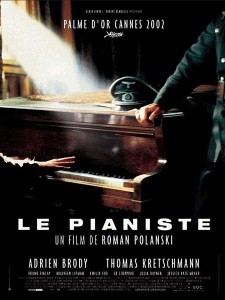Classical music is art music produced or rooted in the traditions of Western music (both liturgical and secular). It encompasses a broad period from roughly the 11th century to the present day. The most outstanding characteristic of classical music is that the repertoire tends to be written down in musical notation, creating a musical part or score. This score typically determines details of rhythm, pitch, and, where two or more musicians (whether singers or instrumentalists) are involved, how the various parts are coordinated. Referred to classical music in the movie,I have to say, Polanski originality in the choice of music is special extremely.
By:130907124 XueMeng Zheng,class 2
Roman Polanski’s classic music film “The Pianist,” as a great director filmed reflects Poland Polish Jews during World War II suffered brutal persecution of German films, inevitably chooses Chopin’s music for the film’s leading music.
 Polanski selected three nocturnes from Fryderyk Franciszek Chopin numerous works, two ballads, a waltz, a prelude, two mazurkas and the end of the movie. Every single music which the director used in the film,they all to the point and also responded to the structure of the film and emotion of the characters.
Polanski selected three nocturnes from Fryderyk Franciszek Chopin numerous works, two ballads, a waltz, a prelude, two mazurkas and the end of the movie. Every single music which the director used in the film,they all to the point and also responded to the structure of the film and emotion of the characters.
At the beginning of the movie, the pianist recorded Chopin’s “Nocturne in c minor” in the studio. Starting with a sad broad tone seems to presage the doom that lives of millions of Jews is end in. In fact, Polanski used here is entirely facts: September 23, 1939, just as the pianist Spellman recording studio in Warsaw Chopin’s while Nazi bombs relentlessly falling down.
The most thrilling fragment of movie is when the pianist’s tribulations will get over, in order to open cans of a room, was found by a German officer beside the fireplace .At this time, the first movement of the “Moonlight Sonata” floated vaguely, this music will play German officer full of compassion, filled with melancholy and frustration, which suggested that he is an appreciator of art and sympathizers and hinted his German executioner cruel nature. With this ground work, he, as a German officer, linger adventure to save a Jewish artist born unlucky, it does not seem abrupt. . . .
At the last moment of life, the pianist chose to play Chopin’s “g minor first Ballade.” This is a morally choice, he wants to use the last moment of life, to express their opposition to the persecutor.




